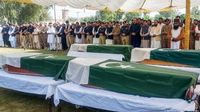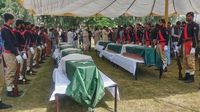In a grim escalation of violence along Pakistan’s northwestern border, a string of deadly attacks has left more than 20 security officials and several civilians dead, underscoring the mounting instability in Khyber Pakhtunkhwa province. The region, which hugs the border with Afghanistan, has become a flashpoint for militant activity in recent years, with the Pakistani Taliban—formally known as Tehreek-e-Taliban Pakistan (TTP)—at the center of the latest bloodshed.
The carnage began late on October 10, 2025, when militants launched a coordinated assault on a police training center in Dera Ismail Khan, a city that has seen its share of violence but rarely on this scale. According to Arab News and corroborated by multiple agencies, the attack was initiated by a suicide bomber who rammed an explosives-laden vehicle into the facility’s gate. The force of the blast was so severe that it caused the wall to collapse, killing two policemen instantly and setting the stage for a fierce gunbattle that raged for nearly six hours.
“After the initial blast, the attackers managed to storm the facility, where about 200 recruits and their trainers were present,” Dera Ismail Khan police chief Sajjad Ahmad told The Associated Press. Miraculously, all trainees and staff were safely evacuated, but the toll on security forces was devastating: seven policemen were killed and 13 others wounded before the compound was finally cleared. Six militants died in the firefight, and police later recovered suicide vests, explosives, weapons, and ammunition from the attackers, according to statements reported by AFP and Deutsche Welle.
This was only the beginning. In the early hours of October 11, militants struck again—this time targeting the Hassan Khel police station on the outskirts of Peshawar. Muhammad Alam, public relations officer for the Peshawar police chief, described the scene to Arab News: “The police demonstrated remarkable resilience engaging the terrorists in a fierce battle that lasted for over two hours.” Two suspected militants were killed, several others wounded, and the rest fled, abandoning their dead accomplices. A heavy police presence lingered as a clearance operation swept through the area, a grim reminder of the ongoing threat.
Meanwhile, in the border Khyber district, militants ambushed a paramilitary convoy, killing 11 troops, while a separate clash in Bajaur district left five dead, including three civilians. According to France 24, these attacks were part of a coordinated campaign by the TTP, who claimed responsibility for the violence in messages posted on social media. The group, which is closely linked to but distinct from the Afghan Taliban, has been behind most of the recent violence in Khyber Pakhtunkhwa.
The numbers are staggering. In just one week, at least 32 Pakistani troops and three civilians lost their lives in the border regions, as reported by France 24. The surge in attacks follows a collapse of a fragile truce between the TTP and the Pakistani government in November 2022, and the subsequent withdrawal of US-led forces from Afghanistan in 2021, which many analysts say created a vacuum exploited by militant groups.
The Pakistani government has not minced words about who it believes is responsible for fueling the violence. Islamabad has repeatedly accused the Afghan Taliban of providing safe haven to TTP militants, claiming that cross-border attacks are launched from Afghan soil with impunity. “We will not tolerate this any longer,” Pakistan Defense Minister Khawaja Muhammad Asif declared in parliament, as quoted by Deutsche Welle. “United, we must respond to those facilitating them, whether the hideouts are on our soil or Afghan soil.”
These accusations have not gone unanswered. Kabul has consistently denied harboring militants, instead turning the tables by accusing Pakistan of violating Afghan sovereignty. Tensions reached a boiling point on October 10, when the Afghan defense ministry warned Pakistan of “consequences” after accusing it of bombing a border town. Pakistan did not confirm responsibility for explosions heard in Kabul but asserted its right to defend itself against surging border militancy. The two countries exchanged sharp warnings, with each blaming the other for destabilizing the sensitive frontier.
The TTP’s motivations are rooted in a complex web of grievances, alliances, and shifting power dynamics. While the group is separate from the Afghan Taliban, they share ideological affinities and, according to a United Nations report cited by Deutsche Welle, the TTP “receive substantial logistical and operational support from the de facto authorities,” a veiled reference to the Taliban government in Kabul. The Afghan Taliban, for their part, have steadfastly denied these allegations, insisting they do not allow their territory to be used for attacks against neighbors.
Pakistan’s response to the uptick in violence has been forceful, if not always effective. By mid-September 2025, security forces had launched over 10,000 counterterrorism operations, killing 970 militants, according to military spokesman Ahmad Sharif Chaudhry. The cost, however, has been high: 311 soldiers and 73 police officers have been killed in these operations, reflecting the ferocity and persistence of the militant threat.
The human toll is felt most acutely in the police and paramilitary ranks. Last year alone, at least 75 policemen were killed in ambushes and targeted attacks across Khyber Pakhtunkhwa, according to police data. The violence has not been confined to security forces; civilians have also been caught in the crossfire, as seen in the Bajaur district clash that claimed three civilian lives.
The TTP’s tactics have evolved alongside the shifting security landscape. Suicide bombings, ambushes on military convoys, and attacks on police stations and training centers have become all too common. The attack on the Dera Ismail Khan police training facility was particularly brazen, not only for its scale but for its timing—coming just hours after reports of airstrikes in Kabul that allegedly targeted TTP leader Noor Wali Mehsud. The TTP initially claimed responsibility for the attack but later retracted its statement, adding a layer of intrigue to an already complex situation.
Pakistan’s accusations have not been limited to Afghanistan. In recent months, Islamabad has also accused India of backing militant groups operating in the region, though New Delhi has flatly denied any involvement. These cross-border recriminations have complicated efforts to forge a coordinated response to the surge in militancy, leaving local communities to bear the brunt of the violence.
For the people of Khyber Pakhtunkhwa, the latest attacks are a chilling reminder of the fragility of peace in a region long scarred by conflict. As security forces brace for further assaults and political leaders trade blame, the question remains: can Pakistan stem the tide of militancy, or will the cycle of violence continue to spiral?
For now, the answer remains elusive, but one thing is clear—Khyber Pakhtunkhwa’s security crisis shows no sign of abating, and the stakes for Pakistan, Afghanistan, and the wider region could not be higher.


